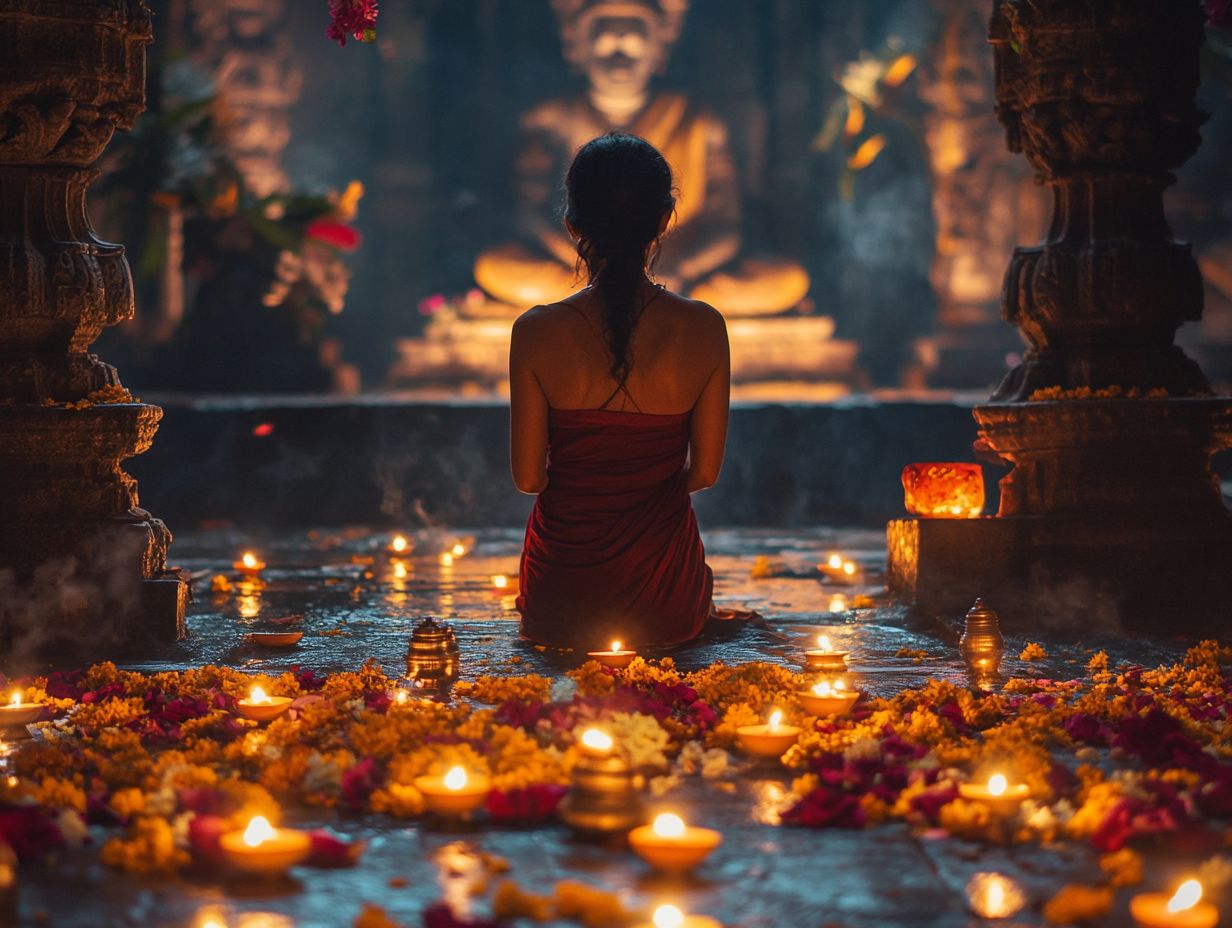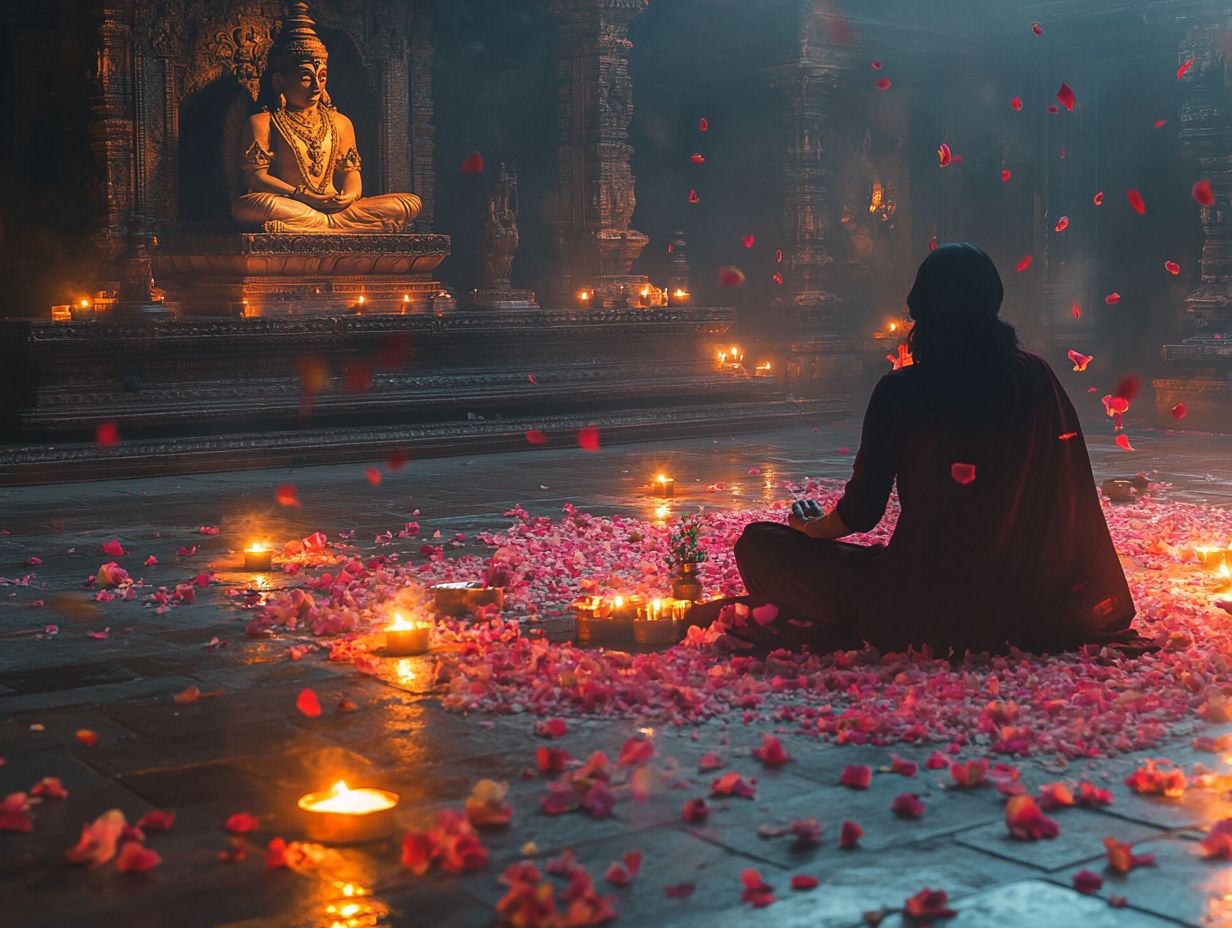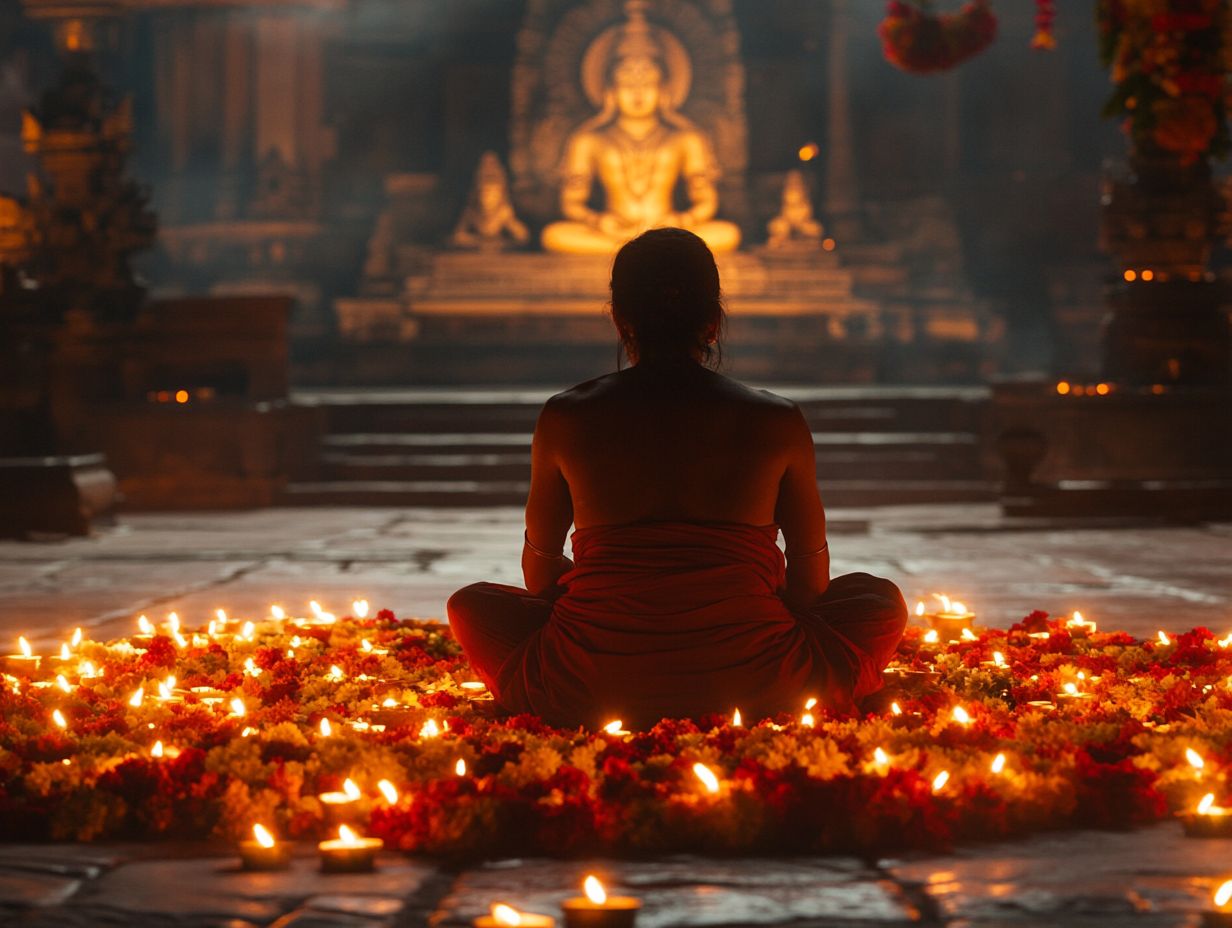Does Hinduism Support the Death Penalty?
The debate surrounding the death penalty is a multifaceted and contentious issue, particularly when examined through the lens of Hinduism. This discussion delves into the historical roots of capital punishment as articulated in Hindu teachings, scrutinizing fundamental concepts such as karma and dharma that influence views on justice, morality, and religious beliefs.
Additionally, it will evaluate the arguments both for and against the death penalty, carefully assessing its ramifications on contemporary society, and how it aligns with Hindu ethics and moral values. The exploration reveals the intricate relationship between Hindu beliefs, religious doctrines, and the ethical considerations of capital punishment, inviting a thoughtful reflection on this profound topic.
What is the Death Penalty?

The death penalty, commonly known as capital punishment, represents a legal process through which a state executes an individual as a consequence for a crime, most often serious offenses like murder, in the pursuit of justice and societal order. This form of punishment consistently ignites passionate debates across diverse societies, prompting profound inquiries into justice, morality, human rights, and ethical frameworks.
The implementation of the death penalty varies markedly among different cultures and legal frameworks, reflecting deeply entrenched societal norms, moral values, and perspectives on crime and punishment. Within the realm of ethical considerations, it presents a complex challenge in balancing retribution with rehabilitation and reformation in the justice system.
History of the Death Penalty in Hinduism and Ancient Scriptures
The history of the death penalty in Hinduism is intricately woven into the faith’s ancient scriptures, such as the Vedas, Upanishads, and Manusmriti, which delineate a complex interplay of justice, morality, and punishment.
For centuries, Hindu society has wrestled with the ramifications of capital punishment, striving to balance the principles of dharma and karma within the broader context of divine law and justice.
This historical backdrop unveils a rich tapestry of interpretations and practices that have evolved over time, influenced by philosophical perspectives, societal attitudes, and scriptural interpretations toward crime and retribution.
The ongoing debate continues to shape contemporary discussions surrounding legal ethics, reform, and legal justice within the Hindu community.
1. The Concept of Karma, Reincarnation, and Spiritual Consequences
In Hindu philosophy, the concepts of karma and reincarnation are pivotal in grasping the moral ramifications of actions and their consequences across this life and the next. Karma, understood as the law of cause and effect, posits that every action, whether virtuous or malevolent, significantly influences one s future existence and spiritual consequences. This principle underscores a belief in divine judgment that surpasses earthly justice.
Such an understanding of karma intricately informs the spiritual beliefs surrounding the death penalty, prompting profound inquiries into morality, punishment, and redemption within the cycle of rebirth and divine justice. The implications of this belief system enrich the ongoing discourse regarding capital punishment within the Hindu community.
By acknowledging that one’s present circumstances are a direct manifestation of past actions, individuals are encouraged to engage in profound self-reflection, nurturing a robust sense of moral responsibility and atonement. This perspective engenders a dichotomy between punitive measures and the possibility of rehabilitation, advocating for a compassionate approach to justice that prioritizes learning and growth over retribution, emphasizing Hindu ethics and moral authority.
The cyclical nature of reincarnation suggests that each soul embarks on a journey toward ultimate liberation, or moksha, fostering the belief that even the most grievous offenses can be redeemed through sincere repentance and personal transformation.
Thus, the interplay between karma and reincarnation not only influences individual conduct but also cultivates a broader societal ethos that values forgiveness, understanding, and spiritual teachings above mere punishment.
2. The Role of Dharma in Hinduism and Legal Philosophy
Dharma, a fundamental principle of Hinduism, embodies the moral and ethical responsibilities that steer individuals in their actions and decisions, deeply shaping the understanding of justice within the faith and legal philosophy.
This guiding tenet acts as a beacon for adherents, influencing not only their personal behavior but also molding the ethical fabric of society and social order as a whole. By establishing a robust framework for moral values, dharma significantly affects how individuals and communities conceptualize justice, often guiding the discourse on the implications of capital punishment, and societal norms.
The reach of dharma extends into the broader landscape of ethical principles, which champion compassion and reform as alternatives to retribution. Such viewpoints provoke thoughtful consideration of how societal norms evolve alongside spiritual beliefs and societal impact, fostering a dynamic dialogue on justice that resonates within contemporary legal and ethical discussions surrounding the death penalty.
Arguments for the Death Penalty in Hinduism and Religious Views
Arguments supporting the death penalty within Hinduism frequently center on the principles of retribution, deterrence, and the quest for justice, illustrating a nuanced interplay of legal ethics, religious views, and moral convictions.
Advocates contend that capital punishment is an essential mechanism for preserving societal order and dissuading serious offenses, resonating with traditional concepts of justice that seek accountability for significant transgressions and uphold social order.
This viewpoint is often bolstered by public sentiment that favors retributive justice in the wake of egregious acts, prompting inquiries into the efficacy and ethical implications of the death penalty within the Hindu moral landscape and punishment ethics.
1. Retribution, Justice, and Punishment Rationale

Retribution, a cornerstone of Hindu philosophy, underscores the necessity of proportional justice as a response to wrongdoing, often aligning with the rationale behind capital punishment and punishment philosophy. This principle posits that grave offenses deserve equally grave penalties, resonating deeply with the moral fabric that informs Hindu ethics, ancient traditions, and societal norms.
The emphasis on retributive justice invites profound discourse on the delicate equilibrium between punishment and forgiveness, challenging the Hindu community to harmonize its spiritual convictions with the imperatives of modern justice and legal punishment.
The ramifications of this retributive stance extend beyond isolated incidents, engaging the collective consciousness of society regarding the concept of justice and social justice. Hinduism underscores the significance of Dharma, or moral order, which necessitates that those who perpetrate egregious acts encounter fitting consequences to restore equilibrium and deter future transgressions, emphasizing moral judgment.
This perspective prompts critical reflection on the ethical underpinnings of capital punishment within contemporary contexts, where the dichotomy of rehabilitation versus retribution emerges prominently.
As society progresses, the reexamination of these ancient philosophies fosters dialogue surrounding mercy, compassion, human dignity, and the potential for redemption. This discourse challenges the conventions of traditional justice systems while honoring the profound teachings that have shaped moral thought, religious tolerance, and fundamental rights for centuries.
2. Deterrence of Crime and Societal Impact
The deterrence of crime is frequently presented as a key justification for the death penalty within Hinduism, positing that the fear of such a severe punishment may dissuade individuals from committing egregious offenses and violent crimes. This argument resonates with a broader perspective on legal systems, viewing capital punishment as a means to uphold societal order, safety, and law and order while addressing the collective concerns surrounding community standards. Nevertheless, the effectiveness of deterrence is a subject of ongoing debate, prompting inquiries into its genuine impact on crime rates, societal values, and the ethical considerations inherent in the Hindu context.
Proponents maintain that the potential consequences of extreme penalties, including capital punishment, create a sense of fear that could deter individuals from perpetrating violent crimes and egregious acts. They argue that this not only serves as a personal warning but also reinforces societal norms, ultimately contributing to a safer community and public safety.
Conversely, critics reference studies indicating that the death penalty does not notably reduce crime compared to life imprisonment and other forms of legal punishment. This enduring discourse highlights the necessity of comprehending the cultural, moral, and pragmatic dimensions of deterrence within the legal framework, as well as the broader implications for community values, socio-cultural context, and standards of justice.
3. Protection of Society and Public Opinion
The death penalty is frequently portrayed as a crucial measure for the protection of society, with the assertion that certain offenders inherently threaten public safety, social order, and moral order. In this light, the justice system is seen as a guardian, tasked with shielding the community from individuals who have committed egregious acts and violent crimes. This raises significant concerns regarding the rights of offenders, victim’s rights, and the ethical implications of capital punishment. Such a perspective underscores a commitment to societal well-being and justice system, although it is laden with the complex moral dilemmas that characterize the ongoing debate over justice, retribution, and punishment ethics.
Proponents of capital punishment contend that it acts as a deterent, potentially dissuading future crimes by instilling fear in those who might otherwise contemplate similar offenses. Conversely, critics emphasize the peril of irrevocable punishment in cases of wrongful convictions, casting doubt on the infallibility of the judicial process. The ramifications of this issue extend beyond individual instances, influencing societal perceptions of justice and fairness.
The discourse also explores the diverse cultural and legal frameworks that surround the death penalty, illuminating the stark global disparities in how societies address severe criminal behavior and their ethical obligations to both victims and offenders.
Arguments against the Death Penalty in Hinduism
Opposition to the death penalty within Hinduism is frequently grounded in the profound reverence for life, which underscores a core belief in non-violence and the possibility of redemption through forgiveness. Critics contend that capital punishment represents an irreversible act that stands in stark contrast to the fundamental principles of Hindu ethics, thereby questioning the faith’s dedication to compassion and rehabilitation.
Additionally, apprehensions surrounding wrongful convictions further complicate the discourse against the death penalty, illuminating the moral quandaries encountered by a justice system that may not always guarantee absolute certainty in its judgments.
1. The Sanctity of Life
The sanctity of life stands as a foundational principle in Hinduism, which champions non-violence (Ahimsa) and reverence for all living beings. This ethical stance fundamentally opposes the death penalty as a means of punishment. It emphasizes the belief that every life possesses intrinsic value and that taking a life regardless of the justification of justice undermines the moral fabric of society. Consequently, advocates against capital punishment contend that prioritizing compassion and rehabilitation aligns more harmoniously with Hindu values than retributive measures.
This commitment to non-violence transcends individual actions, extending into a broader societal responsibility to cultivate an environment that fosters growth and understanding instead of one fueled by vengeance. The teachings of karma further underline the consequences of one’s actions, promoting a transformative approach to justice that seeks healing rather than infliction of harm.
Within this philosophical framework, many adherents of Hinduism perceive the death penalty not merely as an ethical oversight, but as a profound contradiction to the core tenets of their faith, which advocate for peace, empathy, and the potential for redemption in every individual.
2. The Possibility of Wrongful Convictions

Concerns surrounding wrongful convictions present a profound ethical dilemma in the discourse on the death penalty within Hinduism. The irrevocable nature of capital punishment raises the haunting possibility that an innocent life may be unjustly claimed. This scenario ignites critical inquiries into the infallibility of the justice system and the moral obligations of legal authorities to safeguard human rights. The apprehension of executing an innocent individual underscores the imperative for stringent legal standards and comprehensive reforms to guarantee fairness and precision in judicial proceedings.
Moreover, the implications of wrongful convictions extend far beyond the immediate tragedy of lost life; they weave a complex tapestry of enduring ramifications that ripple through society at large. Families ensnared by a flawed justice system often endure trauma that echoes across generations, fostering a deep-rooted skepticism toward legal institutions. The excessive reliance on questionable evidence and unreliable witness testimonies underscores systemic biases that disproportionately impact marginalized communities.
This pressing situation calls for an earnest contemplation of the ethical imperatives of transparency and accountability, along with an unwavering commitment to the continual reassessment of judicial practices. Such reflection is essential to ensure alignment with contemporary ideals of justice and equity.
3. The Concept of Forgiveness and Compassion
The concepts of forgiveness and compassion hold a central place in Hindu moral theology, advocating for the rehabilitation of offenders rather than resorting to retribution through the death penalty. This perspective underscores the potential for personal transformation and spiritual growth, aligning with the belief that every individual possesses the capacity for change and redemption. By prioritizing forgiveness over punishment, proponents argue that Hinduism fosters a more humane approach to justice, one that embodies its fundamental values of empathy and understanding.
Delving into the profound meanings woven within sacred texts, it becomes evident that forgiveness transcends mere action; it represents a profound state of being that enables individuals to rise above their immediate circumstances. Compassion, likewise, calls for a heightened awareness of the interconnectedness of all life, urging society to pursue restorative justice rather than punitive measures.
Such interpretations challenge the prevailing notions of capital punishment, prompting a thorough reevaluation of ethics and the principles of rehabilitation. Advocating for mercy in place of vengeance catalyzes a societal shift towards initiatives that cultivate understanding, support, and transformation, ultimately resonating with the essence of dharma in promoting harmonious coexistence.
Modern Interpretations and Practices of the Death Penalty in Hinduism
Modern interpretations of the death penalty within Hinduism reveal a rich tapestry of perspectives, shaped by contemporary legal frameworks, secular laws, and shifting cultural attitudes toward justice and punishment.
As society navigates the intricate issues surrounding crime and ethical considerations, the Hindu community stands at a pivotal juncture, striving to harmonize traditional beliefs with the current imperatives of justice.
This dynamic interplay between historical doctrine and contemporary norms profoundly influences ongoing discussions regarding the relevance and application of capital punishment in today’s legal landscape.
1. The Influence of Secular Laws
The influence of secular laws on the practice and perception of the death penalty within Hinduism exemplifies the complex tension between religious doctrine and contemporary legal frameworks. As secular legal systems evolve, they impose restrictions and guidelines that shape societal views on capital punishment, challenging traditional interpretations of justice. This dynamic interaction invites contemplation on the extent to which Hindu values are integrated into the legal system and the broader societal implications of such interactions.
The interplay between secular laws and Hindu teachings can instigate significant shifts in public perception regarding the morality and necessity of the death penalty. Many individuals grapple with reconciling their religious beliefs with increasingly human rights-oriented secular perspectives. This discord often gives rise to fervent debates, where proponents of the death penalty invoke deterrence and retribution as fundamental justifications, while opponents appeal to the sacredness of life, a principle deeply embedded in Hindu philosophy.
As discussions surrounding reform persist, the evolving legal landscape is poised to redefine justice, compelling Hinduism to reevaluate its doctrines in the context of modern ethics and societal norms.
2. The Role of Religious Leaders
Religious leaders hold a crucial position in shaping the discourse surrounding the death penalty within Hinduism, acting as moral authorities who significantly influence community standards and ethical considerations linked to justice. Their viewpoints often represent a harmonious blend of traditional beliefs and contemporary insights, guiding their followers through the intricate dilemmas associated with capital punishment.
The participation of Hindu leaders in public debates can profoundly sway opinions and policies concerning the death penalty, underscoring the intricate relationship between faith and law.
In this framework, figures such as priests, monks, and scholars engage thoughtfully with both ancient texts and modern legal structures to articulate positions that resonate deeply with their communities. Their teachings adeptly navigate the subtle moral terrain, addressing critical questions of retribution, forgiveness, and the sanctity of life elements that lie at the heart of Hindu philosophy.
The influence of social movements and discussions around justice reform has prompted many leaders to reassess traditional viewpoints, fostering broader conversations that emphasize mercy and rehabilitation rather than mere retribution.
These dialogues have a significant impact on public sentiment and legislative measures, illustrating how the religious perspective shapes societal attitudes toward justice and the death penalty.
3. The Impact of Social and Cultural Factors

The impact of social and cultural factors on the debates surrounding capital punishment within Hinduism is significant, as public opinion, religious beliefs, and community attitudes greatly influence the discourse on the death penalty. These factors often mirror broader societal norms and values, highlighting the complexities inherent in balancing tradition with contemporary concerns about justice, human rights, and moral values. This interplay continually challenges the Hindu community as it grapples with the moral implications of capital punishment in an increasingly dynamic world, bringing to light the ethical dilemmas it presents.
In many cases, the influence of caste dynamics, historical context, and regional disparities plays a crucial role in shaping perceptions and justifications of the death penalty. For some, the practice is viewed as a necessary tool for justice, reinforcing societal order and serving as a deterrent against heinous crimes. Conversely, there are strong advocates for its abolition, who argue that it fundamentally contradicts Hindu principles of ahimsa, or non-violence. This divergence of views sparks vibrant discussions about ethics, fairness, and the potential for reform within the justice system, as well as the need for retributive justice. The discussions also touch upon the spiritual consequences and moral responsibility associated with such a severe form of punishment.
These ongoing debates underscore the necessity of comprehending the multifaceted nature of capital punishment within the diverse landscape of Hindu thought and practice, including its philosophical arguments, cultural perspectives, and spiritual teachings.
Frequently Asked Questions
Does Hinduism support the death penalty?
There is no clear answer to this question as Hinduism is a diverse religion with different interpretations and beliefs. Some Hindu texts, such as the Manusmriti and the Upanishads, mention the concept of punishment for severe crimes, but there is no specific mention of the death penalty. Interpretations vary, and some view it through the lens of divine justice and moral judgment.
What is the general view of Hinduism on capital punishment?
Hinduism believes in the concept of karma and reincarnation, where a person’s actions in this life will determine their fate in the next. Therefore, the emphasis is on correcting one’s actions, seeking redemption, and offering a chance for atonement rather than punishment through death. This view is deeply rooted in the spiritual beliefs and moral philosophy of the religion.
Are there any Hindu scriptures that mention the death penalty?
The Hindu scriptures, such as the Vedas, the Upanishads, and the Bhagavad Gita, do not have any specific mention of the death penalty. However, there are mentions of punishments for severe crimes, which some may interpret as supporting the death penalty. The interpretations of these ancient scriptures can vary, influencing contemporary views on justice and punishment rationale.
What do Hindu philosophers and scholars say about the death penalty?
Hindu philosophers and scholars have different views on the death penalty. Some believe that it goes against the principle of ahimsa (non-violence), while others argue that it can be justified in certain circumstances to protect society. These debates often delve into the broader context of Hindu ethics, moral authority, and the interplay between ancient traditions and modern implications.
Is there a consensus among Hindus on the death penalty?
No, there is no consensus among Hindus on the death penalty. Some may support it as a form of justice and retributive justice, while others may view it as against the principles of Hinduism. It ultimately depends on one’s personal beliefs, spiritual teachings, and interpretation of Hindu scriptures.
How does Hinduism view the concept of forgiveness in relation to the death penalty?
Hinduism emphasizes the importance of forgiveness, compassion, and the potential for reformation. Therefore, some may argue that the death penalty goes against these principles and that offenders should be given a chance for redemption rather than being put to death. This perspective aligns with the broader ethical frameworks and moral responsibility promoted within Hindu teachings.
